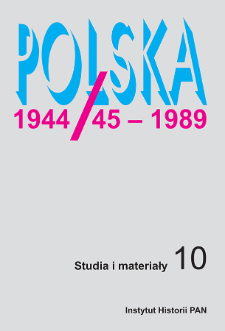- Search in all Repository
- Literature and maps
- Archeology
- Mills database
- Natural sciences
Advanced search
Advanced search
Advanced search
Advanced search
Advanced search

Object
Title: Dokwaterowanie jako temat listów do władz w latach 1945–1956 : komunikat z badań
Subtitle:
Polska 1944/45-1989 : studia i materiały 10 (2011)
Contributor:
Instytut Historii Polskiej Akademii Nauk
Publisher:
Place of publishing:
Description:
Type of object:
Abstract:
The present article is an attempt to outline briefly the “defensive strategies” of the citizens of communist Poland against compulsory assigning of new tenants to their dwellings, presented in the light of the source materials found in the Central Archives of Modern Records in Warsaw. The set of documents contain also the letters about housing matters, addressed, among others, to the Office of the Council of Ministers and the Ministry of Public Administration. Their authors used various arguments, from the appeals to the state’s ideology to their own services on behalf of communist Poland. They were also taking full advantage of their professional position and social standing (this was extremely successful).Assigning new occupants to existing houses was one of the solutions with which the authorities responded to the housing problems within their housing policy. In 1944–1956 the possibility to assign new individuals or whole families to “underpopulated” homes was the subject of hope by some while the subject of concern by others. “Underpopulation” occurred when the living space in square metres per a tenant was bigger than the norm set by the central and local authorities. For example: a family of three persons was allowed to occupy two rooms; a single person, regardless of their professional occupation, could have only one room.As a result of such restrictive regulations issued by the authorities of the Polish People’s Republic, the most aggrieved social group in the struggle for self-contained home became those whom the Republic was supposed to serve – the workers.
Relation:
Polska 1944/45-1989 : studia i materiały
Volume:
Start page:
End page:
Detailed Resource Type:
Format:
Resource Identifier:
oai:rcin.org.pl:59706 ; 2450-8357
Source:
IH PAN, sygn. B.155/10 Podr. ; IH PAN, sygn. B.156/10 ; click here to follow the link
Language:
Language of abstract:
Rights:
Licencja Creative Commons Uznanie autorstwa-Bez utworów zależnych 4.0
Terms of use:
Zasób chroniony prawem autorskim. [CC BY-ND 4.0 Międzynarodowe] Korzystanie dozwolone zgodnie z licencją Creative Commons Uznanie autorstwa-Bez utworów zależnych 4.0, której pełne postanowienia dostępne są pod adresem: ; -
Digitizing institution:
Instytut Historii Polskiej Akademii Nauk
Original in:
Biblioteka Instytutu Historii PAN
Access:
Object collections:
- Digital Repository of Scientific Institutes > Partners' collections > Institute of History PAS > Serials
- Digital Repository of Scientific Institutes > Partners' collections > Institute of History PAS > Institute Publications
- Digital Repository of Scientific Institutes > Partners' collections > Institute of History PAS > Institute Publications > Journals
- Digital Repository of Scientific Institutes > Partners' collections > Institute of History PAS > Institute Publications > Journals > Polska 1944/45-1989
- Digital Repository of Scientific Institutes > Literature > Journals/Articles
Last modified:
Dec 16, 2020
In our library since:
Sep 21, 2016
Number of object content downloads / hits:
442
All available object's versions:
https://rcin.org.pl./publication/78854
Show description in RDF format:
Show description in RDFa format:
Show description in OAI-PMH format:
| Edition name | Date |
|---|---|
| Piwońska, Iwona, Dokwaterowanie jako temat listów do władz w latach 1945–1956 : komunikat z badań | Dec 16, 2020 |
Objects Similar
Piwońska, Iwona
Śmiechowski, Kamil (1985– )
Jarmuż, Michał
Jarmuż, Michał
Zandberg, Adrian
Materski, Wojciech (1944– )
Janowski, Maciej (1963– )

 INSTYTUT ARCHEOLOGII I ETNOLOGII POLSKIEJ AKADEMII NAUK
INSTYTUT ARCHEOLOGII I ETNOLOGII POLSKIEJ AKADEMII NAUK
 INSTYTUT BADAŃ LITERACKICH POLSKIEJ AKADEMII NAUK
INSTYTUT BADAŃ LITERACKICH POLSKIEJ AKADEMII NAUK
 INSTYTUT BADAWCZY LEŚNICTWA
INSTYTUT BADAWCZY LEŚNICTWA
 INSTYTUT BIOLOGII DOŚWIADCZALNEJ IM. MARCELEGO NENCKIEGO POLSKIEJ AKADEMII NAUK
INSTYTUT BIOLOGII DOŚWIADCZALNEJ IM. MARCELEGO NENCKIEGO POLSKIEJ AKADEMII NAUK
 INSTYTUT BIOLOGII SSAKÓW POLSKIEJ AKADEMII NAUK
INSTYTUT BIOLOGII SSAKÓW POLSKIEJ AKADEMII NAUK
 INSTYTUT CHEMII FIZYCZNEJ PAN
INSTYTUT CHEMII FIZYCZNEJ PAN
 INSTYTUT CHEMII ORGANICZNEJ PAN
INSTYTUT CHEMII ORGANICZNEJ PAN
 INSTYTUT FILOZOFII I SOCJOLOGII PAN
INSTYTUT FILOZOFII I SOCJOLOGII PAN
 INSTYTUT GEOGRAFII I PRZESTRZENNEGO ZAGOSPODAROWANIA PAN
INSTYTUT GEOGRAFII I PRZESTRZENNEGO ZAGOSPODAROWANIA PAN
 INSTYTUT HISTORII im. TADEUSZA MANTEUFFLA POLSKIEJ AKADEMII NAUK
INSTYTUT HISTORII im. TADEUSZA MANTEUFFLA POLSKIEJ AKADEMII NAUK
 INSTYTUT JĘZYKA POLSKIEGO POLSKIEJ AKADEMII NAUK
INSTYTUT JĘZYKA POLSKIEGO POLSKIEJ AKADEMII NAUK
 INSTYTUT MATEMATYCZNY PAN
INSTYTUT MATEMATYCZNY PAN
 INSTYTUT MEDYCYNY DOŚWIADCZALNEJ I KLINICZNEJ IM.MIROSŁAWA MOSSAKOWSKIEGO POLSKIEJ AKADEMII NAUK
INSTYTUT MEDYCYNY DOŚWIADCZALNEJ I KLINICZNEJ IM.MIROSŁAWA MOSSAKOWSKIEGO POLSKIEJ AKADEMII NAUK
 INSTYTUT PODSTAWOWYCH PROBLEMÓW TECHNIKI PAN
INSTYTUT PODSTAWOWYCH PROBLEMÓW TECHNIKI PAN
 INSTYTUT SLAWISTYKI PAN
INSTYTUT SLAWISTYKI PAN
 SIEĆ BADAWCZA ŁUKASIEWICZ - INSTYTUT TECHNOLOGII MATERIAŁÓW ELEKTRONICZNYCH
SIEĆ BADAWCZA ŁUKASIEWICZ - INSTYTUT TECHNOLOGII MATERIAŁÓW ELEKTRONICZNYCH
 MUZEUM I INSTYTUT ZOOLOGII POLSKIEJ AKADEMII NAUK
MUZEUM I INSTYTUT ZOOLOGII POLSKIEJ AKADEMII NAUK
 INSTYTUT BADAŃ SYSTEMOWYCH PAN
INSTYTUT BADAŃ SYSTEMOWYCH PAN
 INSTYTUT BOTANIKI IM. WŁADYSŁAWA SZAFERA POLSKIEJ AKADEMII NAUK
INSTYTUT BOTANIKI IM. WŁADYSŁAWA SZAFERA POLSKIEJ AKADEMII NAUK


































